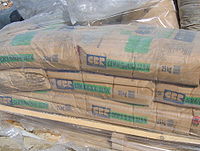
Photo from wikipedia
Abstract Cement-based stabilization by deep mixing or grouting is a popular method used to enhance soft clay ground because clay gradation has a significant effect on its unconfined compression strength.… Click to show full abstract
Abstract Cement-based stabilization by deep mixing or grouting is a popular method used to enhance soft clay ground because clay gradation has a significant effect on its unconfined compression strength. However, the functional relationship between the gradation and the strength is currently unclear, which limits the assessment and cognition for the strength formation of cement-based stabilized soft clay. Strength experiments controlling the sand ratio were conducted, in addition to the literature review, to clarify the sand incorporation effect on the strength. An effective cement ratio (the mass ratio of cement to involved clay) was proposed to evaluate the strength of stabilized clay with sand incorporation. In order to combat data dispersion and the labour-intensive nature of these experiments, meso-mechanical numerical simulations were carried out by the finite element method. This served to enrich the data and clarify the mesoscopic mechanism. The numerical result indicates that the strength of stabilized clay at low sand incorporation ratio is mainly controlled by the strength of the cement-clay-water matrix, thus verifying the rationality of studying the effective cement ratio. Subsequently, the threshold sand ratio in the cement-clay-water matrix was discussed to optimize the stabilization of soft clay.
Journal Title: Soils and Foundations
Year Published: 2021
Link to full text (if available)
Share on Social Media: Sign Up to like & get
recommendations!